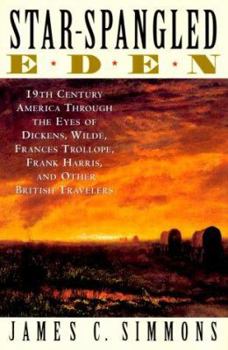Star-Spangled Eden: 19th Century America Through the Eyes of Dickens, Wilde, Frances Trollope, Frank Harris, and Other British Tra
Select Format
Select Condition 
Book Overview
From 1830 to 1880, America transformed itself into a modern nation. This illuminating social and political history is told through the eyes of Dickens, Oscar Wilde, Frances, Trollope, Frank Harris, and other British travelers who commented on the America of that time.
Format:Hardcover
Language:English
ISBN:0786707348
ISBN13:9780786707348
Release Date:April 2000
Publisher:Basic Books
Length:368 Pages
Weight:1.50 lbs.
Dimensions:1.4" x 6.4" x 9.3"
Customer Reviews
2 ratings
Entertaining, Offbeat Look at 19th Century US History
Published by Thriftbooks.com User , 21 years ago
In "Star Spangled Eden," James Simmons joins adventure story, mini-biography, and travelogue for a refreshing look at mid-19th century American history. He allows us to see through the eyes of British artists (Fanny Kemble) authors (Charles Dickens, Civil War reporter "Bull Run" Russell) and adventurers (Frank Harris, Richard Burton) trying to understand and succeed in a growing country just understanding itself."Eden" touches on the seismic events between 1820-1890: slavery, the Civil War and reconstruction, taming of the American West, manifest destiny, the Chicago fire and the start of Mark Twain's "Gilded Age." But letters, newspaper stories, biographies and other first person period literature allow Simmons to show the humanity behind them even at its most graphic (Part II, covering "The Western Frontier," contains most of the book's goriest images.) You read of Dickens' "quarrel with America" over copyright infringement and Frances Trollope's disgust with perceived American misogyny, egalitarianism and even table manners. These resulted in two books causing national furor and turning American goodwill against their respective authors. (Several chapters repeat disgust with tobacco spittle and a savage American press.) Most notably, in Kemble's chapter, Simmons shows how America's shame of slavery tears a nation and family asunder.But each of Simmons' subjects is astounded at America's natural beauty (most notably west of the Mississippi) and earnestness even while complaining of crude manners or(as Oscar Wilde did wittily in the chapter on his American tour)aesthetics. Simmons allows some sense of closure when saying those gleaning the most from their American experience assimilated themselves best into it. This covered episodes from Wilde drinking American friends and rivals under the table to Burton and mountain man George Puxton adapting clothes, mannerisms and even speech from their new neighbors. This contrasts with Trollope and Dickens who,in Simmons words, "had no appreciation of America as a vigorous, expanding nation." Through his anecdotes, Simmons allows you to see American growing pains his characters often could not.Simmons' only misstep is forgiveable. In Wilde's chapter he tells of presidential assassin Charles Guiteau, whose trial and execution for shooting James Garfield becomes a media circus, prefacing celebrity trials even as he identifies Wilde as "the first modern celebrity...famous for being famous." You expect Simmons to make a larger point on Guiteau's perverse interpretation of what Wilde considered the art of his own life, but Simmons never quite does. (It would also have helped to read of Wilde's meeting fellow iconoclast Ambrose Bierce.) Regardless, Simmons succeeds at the aim of his acknowledgements. "With proper research and attention to the small details of place, action, and character," he writes, "formal history could be written to read as easily and effortlessly as the finest historical romance." Indeed,
Entertaining and Intriguing American History
Published by Thriftbooks.com User , 24 years ago
I loved Star-Spangled Eden. This well researched history reads like a historical romance. Simmons covers 50 of the most critical years of American History, 1830-1850, through the eyes of eight British men and women who came here, traveled widely, and had marvelous adventures. Each traveler plugs into a major theme of the era when the country developed from raw frontier to a modern industrial state and provides a unique perspective on important events of this period - the Southern slavery system, the Civil War, the exploration and settlement of the West, etc.My favorite chapter is the last one on Oscar Wilde's witty eleven-month cross-country American tour. To quote the author, "Here was the leading British snob, an effete poseur of highly refined sensibilities, lecturing American audiences from Boston to Leadville on the principles of aesthetics and becoming a popular celebrity in the process. Wilde found himself growing inordinately fond of Americans. A less unlikely love match could scarcely be imagined."Simmons writes great history-of-travel books. I first discovered him with Castaway in Paradise: The Incredible Adventures of True-Life Robinson Crusoes. I recommend these books to anyone looking for a great read that's based on fact.






